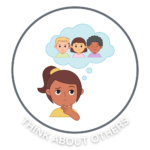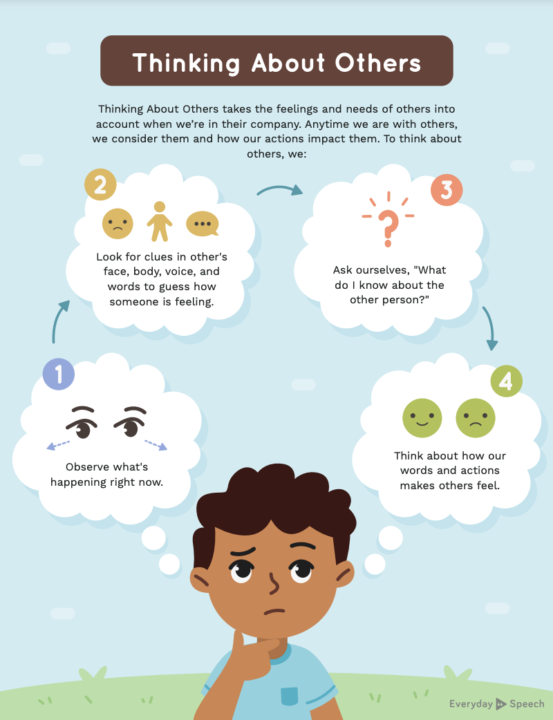Download 30+ Printable Social Skills Posters
Ready-to-use visuals for emotional regulation, self-advocacy, and more

Empathy is a crucial skill that helps children understand and respect others’ feelings. For young learners, especially those with unique learning needs, developing empathy requires guidance and structured practice. Special educators play a vital role in teaching empathy, and one effective tool to support this is the “Thinking About Others Social Skills Goal Poster” from Everyday Speech.
This interactive poster encourages students to set social goals, reflect on how their actions affect others, and develop empathy. With Everyday Speech’s resources, elementary special educators can guide students in thinking about others, helping them build respectful and kind relationships. Let’s explore how you can use the Thinking About Others Social Skills Goal Poster to teach empathy in your classroom.
What is the Thinking About Others Social Skills Goal Poster?
The “Thinking About Others Social Skills Goal Poster” is an engaging visual tool designed to help students reflect on their actions and set empathy-related goals. The poster includes prompts and examples that encourage students to consider how their behaviors impact those around them. By using this tool, students practice thinking about others in a structured, supportive environment.
This goal poster is part of Everyday Speech’s comprehensive social skills curriculum, which offers resources that empower students to build positive social connections. Through consistent practice, students learn to see situations from different perspectives and develop a deeper understanding of empathy.

Key Benefits of the Thinking About Others Social Skills Goal Poster
Teaching empathy with the Thinking About Others Social Skills Goal Poster offers multiple benefits. Here’s how this tool can support your efforts as a special educator.
1. Encourages Self-Reflection
The goal poster provides prompts that guide students to think about how their actions affect others. Reflecting on their behavior helps students develop self-awareness and empathy.
2. Fosters Positive Social Interactions
When students understand the importance of thinking about others, they naturally engage in kinder, more respectful interactions. Empathy leads to better communication, making the classroom a more harmonious place.
3. Builds Confidence in Social Situations
Using the goal poster, students learn how to interact positively with peers. This practice boosts their confidence in social settings, as they feel more prepared to approach others with kindness and understanding.
Using the Thinking About Others Social Skills Goal Poster in Your Classroom
Introducing the Thinking About Others Social Skills Goal Poster to your classroom is simple. Here’s a step-by-step guide to making the most of this tool.
Step 1: Introduce the Concept of Empathy
Start by explaining what empathy means. Use language that’s easy to understand, such as, “Empathy is when we try to feel what others are feeling.” Share examples of how thinking about others can help us be better friends and classmates.
Step 2: Set Up the Poster
Display the Thinking About Others Social Skills Goal Poster in a visible spot in the classroom. Explain that this poster is a place for students to set goals related to kindness, respect, and thinking about others. Point out different sections of the poster, showing them how they can use it to reflect on their behavior.
Step 3: Model Goal-Setting
Choose an example goal with the class, such as “I will listen when others speak.” Write this goal on the poster and discuss why it’s important. Model how to think about how this goal might affect others, like making them feel respected and valued.
Step 4: Encourage Daily Reflections
Encourage students to reflect on their actions daily. At the end of the day, gather the class and discuss examples of when they thought about others. Ask questions like, “How did it feel when you helped a friend?” or “What did you notice when you listened to others?” This reflection helps students internalize empathy.
Unlock all of our Social Skills Posters by signing up for your free trial today – no credit card required!
Access the full Social Communication Curriculum HERE!
Instant access to thousands of no-prep social skills activities, over 1000+ video lessons, and engaging games designed to enhance learning and development.
Activities to Reinforce the Thinking About Others Poster
Along with the poster, use these activities to reinforce empathy and social skills in your classroom.
1. Role-Playing Scenarios
Create role-playing exercises where students practice empathy. For example, one student could act out feeling sad, while another shows ways to offer support. Role-playing helps students see empathy in action and understand how it feels to support others.
2. Kindness Chain Activity
Start a “kindness chain” in the classroom. Every time a student does something thoughtful, add a link to the chain. Over time, the growing chain will serve as a visual reminder of all the positive actions and inspire students to continue thinking about others.
3. Daily Empathy Check-In
Ask students to share one way they thought about someone else that day. This daily practice reinforces empathy and encourages students to actively think about their impact on others.
Frequently Asked Questions for Special Educators
Q: How often should I use the Thinking About Others Social Skills Goal Poster?
A: Use the poster daily or weekly. The more often students reflect on their actions, the more they’ll internalize empathy.
Q: What age group is the poster suitable for?
A: This poster is ideal for elementary students. It’s designed to be age-appropriate and easy to understand.
Q: How can I measure students’ progress in empathy?
A: Observe interactions over time. Notice if students are more thoughtful, kind, and respectful in group settings.
Everyday Speech’s Goal Posters: An Essential Resource for Social Skills
Everyday Speech offers an entire unit on social skills development, including resources like the Thinking About Others Social Skills Goal Poster. This poster, along with other Everyday Speech materials, provides structured support for teaching empathy. With video modeling, interactive worksheets, and reflection activities, Everyday Speech helps educators guide students toward meaningful social growth.
Using these resources, special educators can foster a classroom culture of respect and kindness. Everyday Speech makes it easier to teach empathy, empowering students to think about others and build positive relationships.
Conclusion: The Power of the Thinking About Others Social Skills Goal Poster
Teaching empathy to elementary students is essential for building a supportive, respectful classroom. The Thinking About Others Social Skills Goal Poster from Everyday Speech is a powerful tool that encourages students to reflect on their actions and set empathy-related goals. By using this poster, you can create a learning environment where students feel motivated to consider others’ feelings and act with kindness.
Incorporate the Thinking About Others Social Skills Goal Poster into your daily routine to help students develop empathy over time. With your guidance, they’ll learn the value of thinking about others, creating a classroom that celebrates kindness and understanding.
Sample Video
Students learn best by watching others their same-age model the behavior! Check out a sample video modeling lesson below. We offer our entire Social-Emotional Learning platform free for 14 days here!
Related Blog Posts:
Teaching Elementary Students Group Work in the Classroom
Enhancing Group Work Skills in Elementary Students: A Guide for Educators
Teaching Participation: Engaging in Group Activities for Elementary Students





